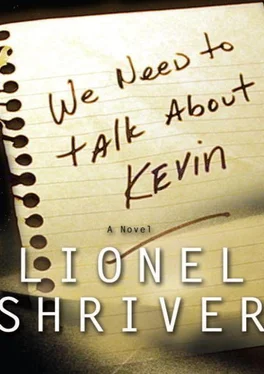So I began to conclude that the marketing people’s heads were up their backsides. They had researched the demand, but not the supply. I did not have faith that even our intrepid army of college students and my thoroughgoing staff could put together a solitary volume that would protect its users from making the grossest of missteps for which they could pay so dearly that a continent full of bargains would still seem overpriced. For once I did feel motherly—toward customers like Siobhan, and the last place I’d want pastily complected, there’s-good-in-all-of-us Siobhan to end up was in a scorching, pitiless Nairobi slum. AFRIWAP was a nonstarter.
But my greatest disappointment was in myself. While relinquishing the idea of AFRIWAP might have freed me to gallivant about the continent without taking notes, I’d grown dependent on research for a sense of purpose on the road. Released from an itinerary dictated by conveniently tabbed chapters, I felt aimless. Africa is a lousy place to wonder incessantly what you are doing there, though there is something about its careless, fetid, desperate cities that presses the question.
I could not shut you and Kevin from my mind. That I missed you fiercely served as an aching reminder that I had been missing you since Kevin was born. Away, I felt not emancipated but remiss, sheepish that unless you’d finally solved the nanny problem you’d have to cart him with you in the pickup to scout. Everywhere I went, I felt laden, as if slogging the potholed streets of Lagos with five-pound leg weights: I had started something back in New York, it was not finished by any means, I was shirking, and what’s more, what I had started was going badly. That much I faced; that much my isolation was good for. After all, the one thing you cannot escape in Africa is children.
In the latter legs of the three-month trip, which you’ll recall I cut short, I made resolutions. One too many sojourns—this one launched less in a spirit of exploration than simply to make a point, to prove that my life had not changed, that I was still young, still curious, still free—was only proving beyond doubt that my life had indeed changed, that at fortyone I was not remotely young, that I had truly sated a certain glib curiosity about other countries, and that there was a variety of liberty of which I could no longer avail myself without sinking the one tiny island of permanence, of durable meaning and lasting desire, that I had managed to annex in this vast, arbitrary sea of international indifference.
Camping in Harare’s airport lounge on gritty linoleum because there were no seats and the plane was eight hours late, the whole 737 having been appropriated by some government minister’s wife who wanted to go shopping in Paris, I seemed to have unaccountably lost my old serene certainty that inconvenience (if not outright disaster) was the springboard for nearly every proper adventure abroad. I was no longer persuaded by that old saw planted in every AWAP intro that the worst thing that can happen to any trip is for everything to go smoothly. Instead, like any standard Western tourist, I was impatient for air-conditioning and disgruntled that the only available drinks were Fanta orange, which I did not like. With the concessions’ refrigeration broken down, they were boiling.
That sweaty, protracted delay allowed me to contemplate that so far my commitment to motherhood had been toe-in-the-water. In a funny way, I resolved, I had to remake that arduous decision of 1982 and jump into parenthood with both feet. I had to get pregnant with Kevin all over again. Like his birth, raising our son could be a transporting experience, but only if I stopped fighting it. As I was at pains to teach Kevin for years thereafter (to little effect), rarely is the object of your attentions innately dull or compelling. Nothing is interesting if you are not interest ed . In vain, I had been waiting for Kevin to prove out, to demonstrate as I stood arms folded that he was worthy of my ardor. That was too much to demand of a little boy, who would only be as lovable to me as I allowed him to be. It was past time that I at least met Kevin halfway.
Flying into Kennedy, I was bursting with determination, optimism, and goodwill. But in retrospect, I do feel obliged to observe that I was at my most passionate about our son when he was not there.
Merry Christmas, Eva
Dear Franklin,
Having asked gently beforehand if I was up to it, tonight my mother had a little holiday hen party here, and I think she regretted her timing. As it happened, yesterday in Wakefield, Massachusetts, a very large, unhappy man—a software engineer named Michael McDermott, who the whole nation now knows is a science fiction fan, much as most men off the street are familiar with our son’s predilection for undersized clothing—walked into Edgewater Technology with a shotgun, an automatic, and a pistol and murdered seven of his coworkers. I gather Mr. McDermott was upset—and here I am, conversant with details of his financial life, down to the fact that his six-year-old car was on the verge of repossession—that his employers had garnished his wages for back taxes.
I couldn’t help but think of your parents, since they don’t live far from Wakefield. Your father was always concerned that his top-of-theline appliances have a fine sense of proportion, a preoccupation that surely extends to behavioral ratios like grievance to redress. Your parents must imagine that the world of the physically preposterous, which doesn’t respect materials , is closing in on them.
Having long since given up on the painful charade of inviting Sonya Khatchadourian for soirees in return and suffering the kind of fanciful excuses she always supplied me for why she could not attend opening night of my school play, these old birds had sampled my mother’s lahmajoon and sesame-topped ziloogs many times before and were disinclined to dwell on the finger food. Instead, with some diffidence, given the guest of honor, they were all dying to talk about Michael McDermott. One dowager commented sorrowfully that she could see how a young man might feel rejected with a nickname like “Mucko.” My crusty Aunt Aleen muttered that her own ongoing fight with the IRS—a $17 disputed underpayment in 1991 had over the years ballooned from interest and late fees to over $1,300—might soon move her to firearms herself. But they all subtly deferred to me, the resident expert with insight into the twitchy mind.
I was finally forced to remind these women firmly that this friendless, overweight loner and I had never met. It seemed to register all at once that no one in this country specialized in plain old murder these days, any more than a lawyer would study plain old Law. There was Workplace Massacre, and there were School Shootings, quite another field of concentration altogether, and I sensed a collective embarrassment in the room, as if they’d all rung the Sales Department when they should have asked for Customer Relations. Since it’s still too dangerous to bring up “Florida” in company without being sure that everyone is on-side, someone prudently changed the subject back to the lahmajoon .
Anyway, who says crime doesn’t pay? I doubt the IRS will ever see a dime of Mucko’s money now, and the forty-two-year-old tax cheat is bound to cost Uncle Sam a far prettier penny in prosecution costs than the IRS would ever have squeezed from his paycheck.
That’s the way I think now, of course, since the price of justice is no longer an abstract matter in my own life but a hard-nosed tally of dollars and cents. And I do often have little flashbacks of that trial—the civil trial. The criminal one is almost a blank.
Читать дальше












